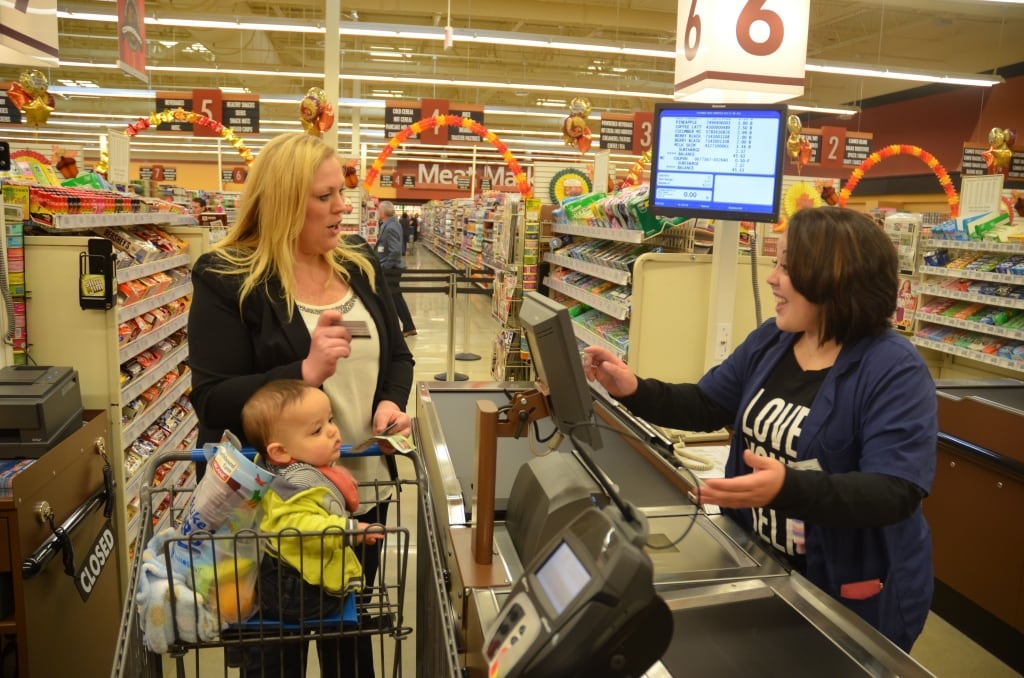For the 4.1 million people who are newly eligible for shopping privileges on military installations, defense officials have provided some more details on access to the new shopping and recreation benefits open to them as of Jan. 1.
Officials have outlined a temporary solution for veterans who have a service-connected disability, but their income is too high to qualify for a Veteran Health Identification Card, or VHIC. That VHIC is the required credential for eligible veterans to gain entry into installations, to shop at commissaries, exchanges and to use certain morale, welfare and recreation facilities. The temporary solution is to accept the veteran’s Health Eligibility Center Form H623A that indicates they have been placed in Priority Group 8E, along with an acceptable credential such as a U.S. passport or a REAL ID-compliant driver’s license, until defense officials identify a long-term credential for this group.
However, one of those veterans who falls into that category contacted by Military Times said that she is not familiar with the letter and form, and hasn’t yet been able to get information from the Department of Veterans Affairs about getting the document.
About 37,000 veterans have been classified by the VA as having a 0 percent service-connected condition, but their income is too high to qualify for the health care card. Yet these veterans are still eligible for these new shopping benefits.
The new benefits were authorized by law for all veterans with VA service-connected disability ratings; Purple Heart recipients; veterans who are former prisoners of war; and primary family caregivers of eligible veterans under the VA caregiver program. Previously those with a 100 percent service-connected disability rating, and Medal of Honor recipients were allowed the benefits.
It’s the largest patronage expansion in more than 60 years.
RELATED

The new customers receive access to commissaries, exchanges and MWR Category C revenue-generating programs on the same basis as a retired military member. These revenue-generating programs are primarily self-supporting and receive limited taxpayer dollars.
Examples of MWR activities new patrons can use:
*recreational lodging and resorts
*golf
* bowling
*clubs
*entertainment
*recreational swimming pools
*restaurants
*marinas
*movie theaters
*vehicle storage
*kennels
*equipment rentals
In addition, in a recent memorandum, defense officials stated that these new patrons have access to official DoD temporary duty and permanent change of station lodging facilities on a space-available basis. They have access to Category B bowling facilities — which rely more on taxpayer funding. The patrons will have access to Category B camping activities, equipment check-out, marinas, and other Category B activities that are combined or co-located with similar Category C activities.
The DoD memo gives the military services the authority to allow these patrons to use other Category B MWR activities, when there is excess capacity, and where user fees cover most of the operational expenses. Child development centers and programs aren’t included as part of this new benefit.
Certain installation facilities and programs which are funded almost entirely by taxpayer dollars, such as fitness centers, gyms, and libraries, aren’t open to the new group of patrons. There are some distinctions of note: for example, a recreational swimming pool would be open to these patrons, but not pools that are designated as aquatic training facilities.
For those veterans eligible for these new benefits, authorized by law, their VHIC card must display the designation of “Purple Heart,” “Former POW,” or “Service Connected.” Visit https://www.va.gov/healthbenefits/vhic for information about eligibility for the VHIC and the application process.
Caregivers approved and designated as the primary family caregivers of eligible veterans under the VA Program of Comprehensive Assistance for Family Caregivers must present their eligibility letter from the VA’s Office of Community Care at the installation gate, along with an acceptable credential such as a U.S. passport or REAL ID-compliant driver’s license.
Most installations’ front gate scanning systems now have the capability to scan the VHIC cards. However, these newly-eligible patrons should allow some extra time when they first visit the installation to stop at the visitor control center, where they must pass an on-the-spot background check. Depending on the type of installation, patrons may be enrolled for recurring access to allow them to proceed to the gate without stopping at the visitor control center on future visits.
Spouses can’t buy anything, but they and other family members can accompany the veteran into the store.
Karen has covered military families, quality of life and consumer issues for Military Times for more than 30 years, and is co-author of a chapter on media coverage of military families in the book "A Battle Plan for Supporting Military Families." She previously worked for newspapers in Guam, Norfolk, Jacksonville, Fla., and Athens, Ga.





